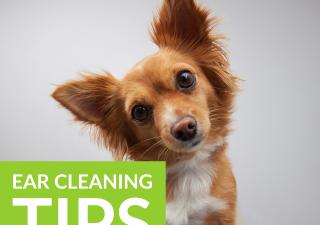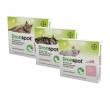
Keeping your pets safe at Easter
Back to overviewMaking sure your family has a wonderful Easter is a top priority. With so many gatherings and chocolate Easter eggs in abundance - it’s a wonderful time of the year. So the idea of a chocolate ban would be totally out of the question? For you probably yes - but for your dog or cat chocolate can be very dangerous.
Why is chocolate so toxic to animals?
Chocolate contains a stimulant called theobromine which is highly toxic, the darker the chocolate, the higher percentage of cocoa and the more theobromine present.
How fast does chocolate poisoning take effect?
The effects of theobromine poisoning can be seen anywhere from 4 to 24hrs after eating and can affect the heart (causing irregular rhythms), the kidneys and the central nervous system. In serious cases it can cause seizures and death.
What do I do if I think my pet has eaten chocolate?
There is no antidote for theobromine or chocolate poisoning, but prompt treatment by your vet can make all the difference. The quickest and most efficient way of getting any eaten chocolate out of your pets’ stomach is by making them vomit – this is something which should only be carried out by your vet using a type of drug called an emetic. Never attempt to make your pet vomit by giving them anything at home as this could pose a far more serious risk and make matters worse.
If your pet has managed to eat any chocolate, then contact your vet straight away for advice and possible treatment. The good news is that if treated promptly, they stand a very good chance of being absolutely fine!
Other foods to avoid this Easter
Alcohol - Considerably more toxic to our pets than to us, even in small volumes. It can cause vomiting, diarrhoea and incoordination. In more serious cases it can cause breathing difficulties, liver failure, brain damage, coma and death. So keep any alcohol well out of reach of your pets this Easter.
Grapes and raisens - The active toxin present in grapes and raisins is not fully understood and whilst one pet may be unaffected by eating multiple grapes or raisins, another pet could suffer from acute kidney failure from eating as little as one grape or raisin. The difficulty is not knowing which pets might be affected to a more serious degree, therefore the best thing is to avoid your pets having access to grapes or raisins at any time.
Table scraps – A lot of us will be having a roast dinner at some point over the Easter period and our pets will often benefit from this too. However, please be aware that some of the foods which are safe for us are not so safe for our pets. Any uncooked or raw foods have the potential to carry E.Coli or Salmonella which can cause vomiting and diarrhoea. Even cooked meats which your pet is not used to having may also cause an upset stomach. Be very careful to dispose of any meat netting or tin foil safely as cats and dogs may eat this not realising how dangerous it can be in potentially causing an intestinal blockage.
Bones (Cooked or uncooked) – These can also pose a risk of intestinal blockage, or even perforation of the intestines due to the sharp edges.
Above all – despite the warnings - enjoy the Easter holiday with your families and pets. The information about chocolate poisoning may sounds scary, but understanding the impacts are important to ensure you keep your pets safe and you all enjoy the season. Don’t forget, there are pet friendly ‘chocolate’ options available if you feel sad for your furry pals while you enjoy your eggs.
Tips & Tricks
- Easter is a wonderful time of year with so many chocolate Easter eggs in abundance, but make sure you do not let your pet near them.
- With Brexit deal still in negotiation and a possibility of a ‘no deal’ scenario, there are no concrete answers just yet – but to help you become more informed, here is our Q&A on what we can find so far.
- Build-up of wax and debris in your pet's ear canals can lead to discomfort and irritation. Cleaning your pet’s ears can have a lot of benefits and here are some tips to get you started!
- We had a great time catching up with Mariann Bayliss, our sponsored agility handler last week. We met her competing dog, Ila, and her 5 month old puppy Coral.









